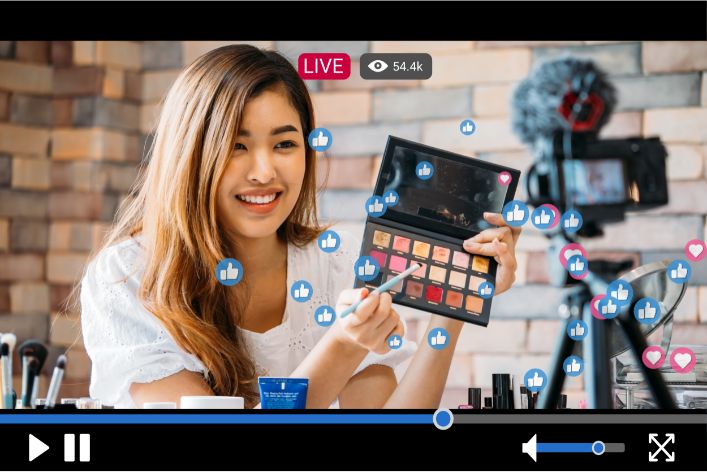In the digital age, social media algorithms rule how we experience content. They set the rules for what we see on our feeds. Understanding them is vital for businesses, content creators, and users alike. Businesses need this understanding to craft effective marketing campaigns.

Content creators optimize posts for greater engagement using this knowledge. Users, on the other hand, need to grasp how these algorithms shape their newsfeeds to ensure they don’t miss crucial updates.
These algorithms consider factors like post relevancy, posting time, search history, and engagement levels. They prioritize content aligned with users’ frequent searches or interactions. Recent updates even promote user-generated content, encouraging community building.
Read: How to Develop a Social Media Marketing Strategy
Types of Social Media Algorithms
Social media algorithms are the backbone of all social media platforms. These algorithms are responsible for deciding what content users see on their newsfeeds, explore pages and other sections of the platform.
Understanding different types of social media algorithms is vital for brands and online creators to navigate the complex world of social media.
A. Facebook Algorithms
Facebook is one of the oldest social media platforms, with over 2.7 billion active users worldwide. Its algorithms play a critical role in determining the content users see on their newsfeeds.
- News Feed Algorithm: This algorithm decides the relevance and order of posts on a user’s news feed based on the user’s engagement history with the content and the timeliness of the posts.
- EdgeRank Algorithm: EdgeRank is an older algorithm that Facebook used to use to determine the visibility of content. Although Facebook no longer uses it, the concept is still applicable and refers to the weightage given to different factors like affinity, relevancy, and time decay.
Read: What is Content Marketing in the Digital Media Sphere?
B. Instagram Algorithm
Instagram is a photo and video-sharing platform that has grown immensely in popularity over the past few years, with over 1 billion active users worldwide. Instagram’s algorithms determine what content users see on their news feeds, and explore pages, and stories.
- Feed Algorithm: This algorithm determines the relevance and order of posts on a user’s feed based on the user’s engagement history with the content, the timeliness of the post, and the user’s content preferences.
- Explore Page Algorithm: The Explore Page algorithm determines what content appears on a user’s Explore Page based on their previous actions on the platform, interests, and other factors.
Read: Safe and Responsible Use of Social Networks
C. Twitter Algorithm
Twitter is one of the oldest social media platforms, and its algorithms determine the content users see on their home timeline and search results.
- Home Timeline Algorithm: Twitter’s Home Timeline algorithm dictates the relevance and order of tweets on a user’s Home Timeline based on the user’s engagement history with the content, the timeliness of the tweet, and the user’s preferences.
- Search Results Algorithm: The Search Results algorithm decides the relevance and order of tweets that appear in a user’s search results based on various criteria like tweets’ popularity, user engagement, and other factors.
Understanding social media algorithms is critical to creating content that resonates with the algorithm and, more importantly, your audience.
By producing content aligned with the algorithm’s preferences and your audience’s tastes, you can increase your visibility, reach new users and develop a loyal following.
Read: How to Protect Your Privacy on Facebook and Instagram
The Impact of Social Media Algorithms
A. Transparency
- Algorithms use user data to personalize content
- Transparency builds trust and helps users understand how their data is used
B. Content Curation
- Algorithms determine what content is shown to users
- Based on user behavior, algorithms curate content and prioritize relevance
C. User Engagement
- Algorithms impact user engagement by showing content that is most likely to be interacted with
- Strategies to increase engagement include creating quality content, using images and videos, and posting at optimal times
Social media algorithms are the driving force behind how content is distributed and consumed online. Understanding the impact of algorithms is crucial for businesses, marketers, and individuals who want to create effective social media strategies.
Read: Understanding Privacy Concerns in Social Media Usage
A. Transparency
Algorithms use user data to personalize content, making it more relevant to each user’s individual interests. However, this personalization also poses privacy concerns. As such, transparency is vital to building trust and helping users understand how their data is being used.
For example, Facebook’s “Why Am I Seeing This?” feature helps users understand why a particular post or ad is being shown to them. Moreover, social media platforms, such as Twitter and LinkedIn, offer settings that allow users to control their data-sharing preferences.
B. Content Curation
Algorithms determine what content is shown to users, based on their behavior and preferences. Through machine learning, algorithms can curate content and prioritize relevance, ultimately optimizing the user experience.
For instance, Instagram’s algorithm curates users’ feeds based on their engagement history, content type, and other factors. Similarly, YouTube’s algorithm recommends videos based on users’ watch history, interests, and subscriptions.
Read: How to Create a Personal Brand on Instagram
C. User Engagement
Social media algorithms impact user engagement by showing content that is most likely to be interacted with. To increase engagement, individuals and businesses need to create quality content that resonates with their audience.
They also need to use images and videos that capture people’s attention, as visuals are more engaging than text alone. Posting at optimal times when their audience is most active, using the right hashtags, and engaging with their followers also increase engagement rates.
Social media algorithms have a significant impact on the way people interact with content online, from what is shown to them to how they engage with it.
Understanding how algorithms work is essential for anyone looking to create a strong online presence. As such, being transparent about data usage, curation, and engagement strategies is crucial for building trust and maximizing engagement rates.
Read: How to Showcase Your Skills on LinkedIn
The Pros and Cons of Social Media Algorithms
Social media algorithms have been around for a while and have been created to help users to receive content that aligns with their interests, beliefs and needs. This has generated a predictably controversial debate around these algorithms, where some view them as beneficial while others see them as detrimental.
The Pros of Social Media Algorithms
Social media algorithms have some advantages that are worth discussing.
- Increased relevance of content: Social media algorithms work to constantly personalize and tailor content to the unique interests and preferences of users. This means users are more likely to come across relevant information they might not have otherwise seen.
- Personalization of user experience: Social media algorithms collect data on user behavior, interests, and activity to create tailored feeds. This personalized experience enhances user engagement by making the platform more user-friendly and attractive to individual users.
- Accessibility to a wider audience: Social media algorithms help to increase visibility for content creators by promoting their content to relevant audiences, thereby giving them access to a wider audience.
Read: The Role of Social Media in Personal Branding
The Cons of Social Media Algorithms
Despite the obvious benefits of these algorithms, some of the flaws cannot be ignored.
- Bias in content curation: Social media algorithms rely heavily on data mining which can result in the ranking and dissemination of misleading and biased content. These algorithms can be weaponized to propagate specific agendas by promoting certain political viewpoints and banning others.
- Reduced visibility for certain users and content: Some social media algorithms use demographic data to determine who gets to see certain types of content. This can lead to the exclusion of certain groups of people from receiving vital information.
- Negative impact on user mental health: Social media algorithms have been shown to be one of the many factors responsible for increased rates of anxiety and depression among users. Users may feel pressure to compare themselves to others, and the constant bombardment of information can lead to feelings of stress and fatigue.
Social media algorithms have their pros and cons. Users can enjoy a more personalized experience with relevant content, while content creators can benefit from increased visibility.
However, social media algorithms can cause mental health issues, and the propagation of biased content and exclusion of content to certain groups of people is a concerning issue.
It is pertinent that social media companies recognize the potential for these negative outcomes and work towards rectifying them.
Read: How to Use Google Analytics for Social Media Tracking
How to Navigate Social Media Algorithms
A. Understanding algorithms
Social media algorithms are complex sets of rules that determine what content is shown to users based on their interests and behaviors.
Put Your Tech Company on the Map!
Get featured on Nicholas Idoko’s Blog for just $50. Showcase your business, boost credibility, and reach a growing audience eager for tech solutions.
Publish NowB. Building a strong social media presence
- Creating quality content is essential to keeping your audience engaged and increasing your reach on social media platforms.
- Engaging with your audience through comments, messages, and shares can also improve your visibility.
C. Utilizing social media tools and metrics
- Analyzing data such as post reach, engagement, and follower growth metrics can provide insights into what’s working and what’s not.
- Utilizing paid advertising can help you reach a wider audience and target specific demographics or interests.
Navigating social media algorithms can be a challenge, but understanding how they work and using the right strategies can help you stay ahead of the game.
Read: What Metrics to Track in Social Media Marketing?
Conclusion
Social media algorithms significantly affect content visibility for users. They utilize user data to deliver personalized content, affecting information validity and credibility.
Understanding these algorithms proves critical for both businesses and individuals. Businesses can optimize social media strategies, effectively reaching their target audiences, with this knowledge. Meanwhile, individuals gain protection against misinformation.
The advice for both groups is proactive research and consultation with experts. Individuals can use content curation tools and fact-checking resources to verify information credibility. Brands can invest in social media analytics tools to discern effective strategies.
To sum up, understanding social media algorithms is essential for strategic optimization and consuming credible, accurate information.
Read: Understanding Digital Media Analytics and Its Importance
Before You Go…
Hey, thank you for reading this blog post to the end. I hope it was helpful. Let me tell you a little bit about Nicholas Idoko Technologies. We help businesses and companies build an online presence by developing web, mobile, desktop, and blockchain applications.
We also help aspiring software developers and programmers learn the skills they need to have a successful career. Take your first step to becoming a programming boss by joining our Learn To Code academy today!
Be sure to contact us if you need more information or have any questions! We are readily available.
[E-Books for Sale]
1,500 AI Applications for Next-Level Growth: Unleash the Potential for Wealth and Innovation
$5.38 • 1,500 AI Applications • 228 pages
Are you ready to tap into the power of Artificial Intelligence without the tech jargon and endless guesswork? This definitive e-book unlocks 1,500 real-world AI strategies that can help you.
See All 1,500 AI Applications of this E-Book
750 Lucrative Business Ideas: Your Ultimate Guide to Thriving in the U.S. Market
$49 • 750 Business Ideas • 109 pages
Unlock 750 profitable business ideas to transform your future. Discover the ultimate guide for aspiring entrepreneurs today!
See All 750 Business Ideas of this E-Book
500 Cutting-Edge Tech Startup Ideas for 2024 & 2025: Innovate, Create, Dominate
$19.99 • 500 Tech Startup Ideas • 62 pages
You will get inspired with 500 innovative tech startup ideas for 2024 and 2025, complete with concise descriptions to help you kickstart your entrepreneurial journey in AI, Blockchain, IoT, Fintech, and AR/VR.
We Design & Develop Websites, Android & iOS Apps
Looking to transform your digital presence? We specialize in creating stunning websites and powerful mobile apps for Android and iOS. Let us bring your vision to life with innovative, tailored solutions!
Get Started Today



